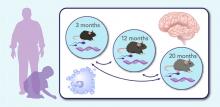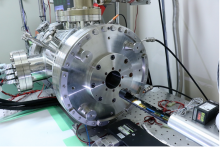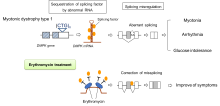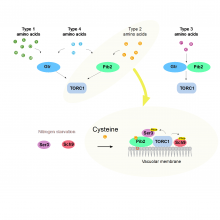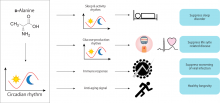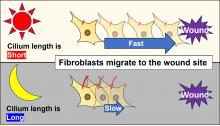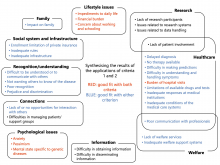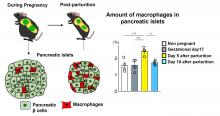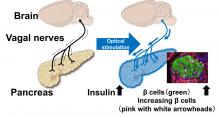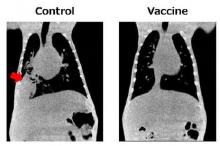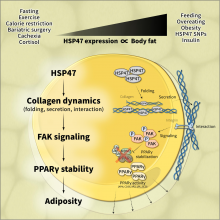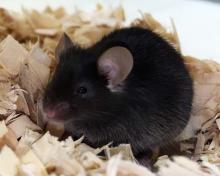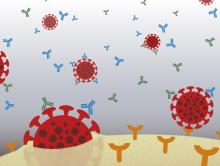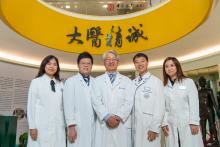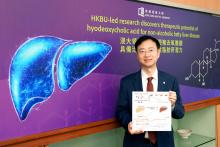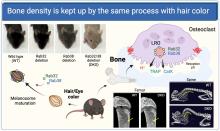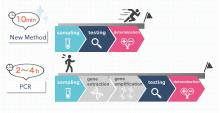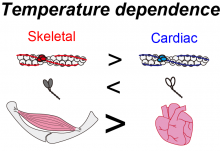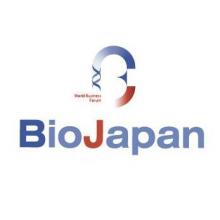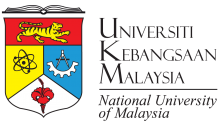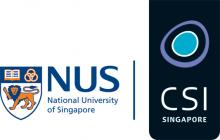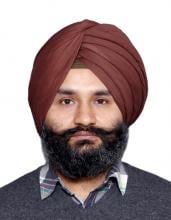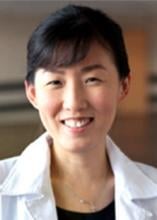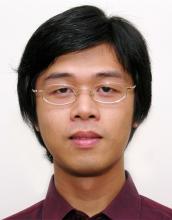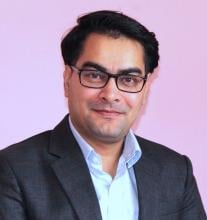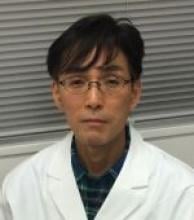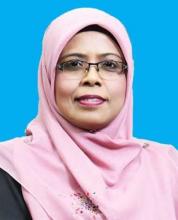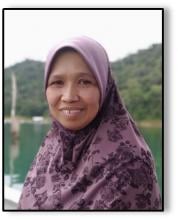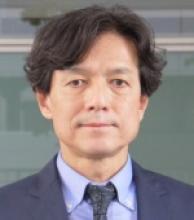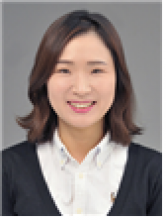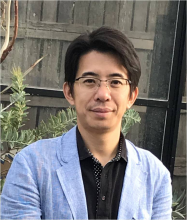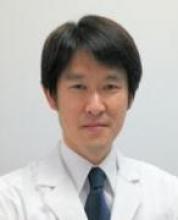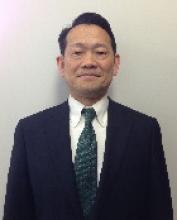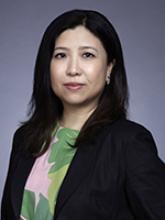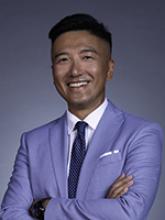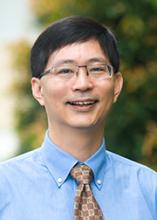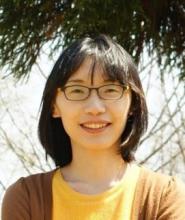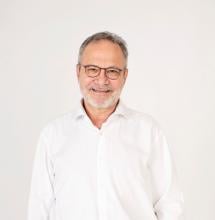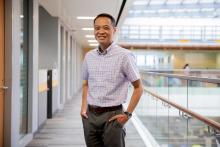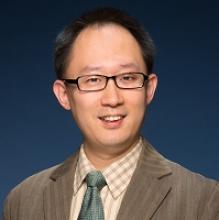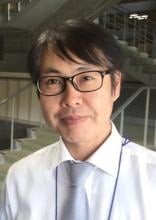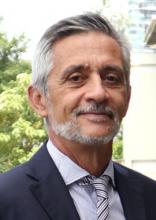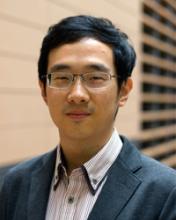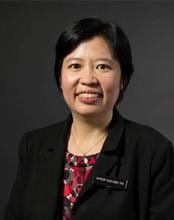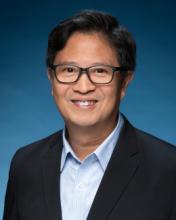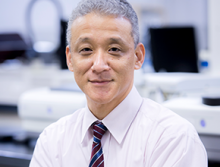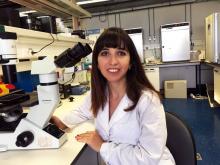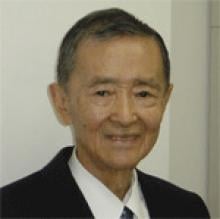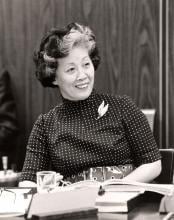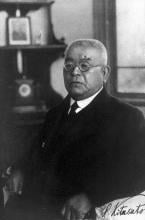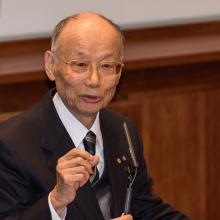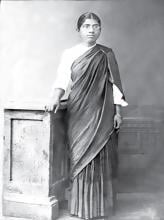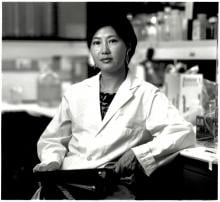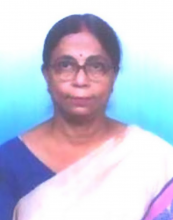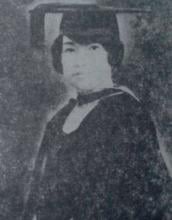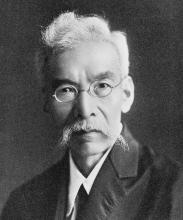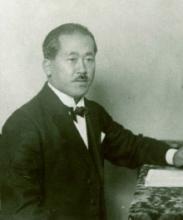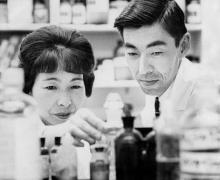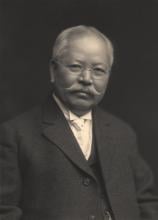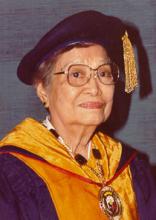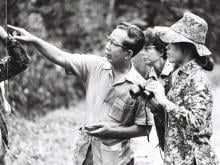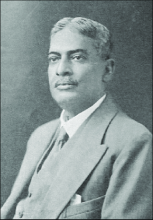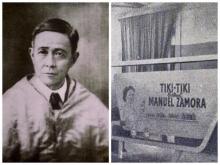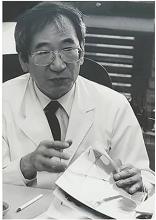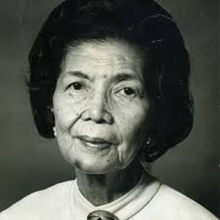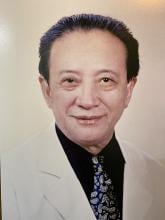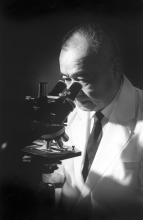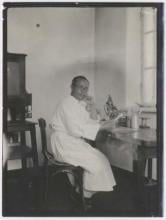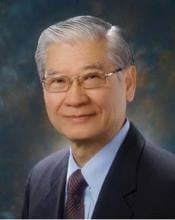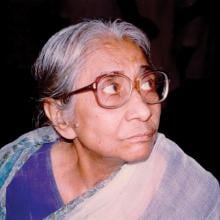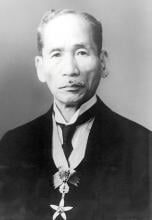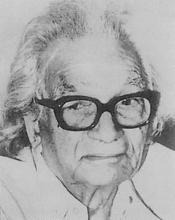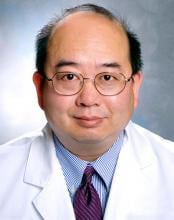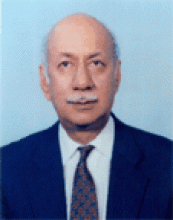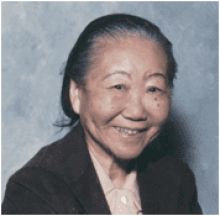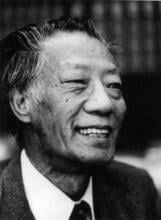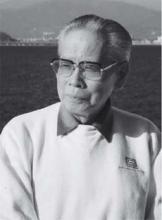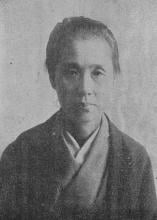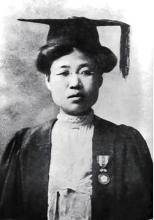Medicine
News
16 Jan 2024
Researchers from Osaka University have discovered a novel treatment to relieve cytokine release syndrome (CRS), a life-threatening inflammation triggered by a serious infection or severe burn. Treatment with a short-acting antibody reduces the inflammatory effects of interleukin-6, a key cytokine in CRS while avoiding the side effects associated with previous longer-acting therapies.
15 Jan 2024
Unleashing stem cells from dog urine, Electronic Tongue, Tapping into human motion energy, How neurons network, and A radical use for plastic bags. Plus Communicating science two decades on. Read all in the latest Editor's Choice.
12 Jan 2024
Much is known about the added complication to pregnancy when it comes to the age of the mother, but recent studies show that the age of the father can also heighten the risk of neurodevelopmental disorders. A team of researchers has explored the impacts of paternal aging on microRNAs, the molecules that play a crucial role in regulating gene expression.
05 Jan 2024
Asia Research News monitors the latest research news in Asia. Some highlights that caught our attention this week are self-sacrificing cancer cells, tiny new drones that kill cancer cells and a living “skin” that covers the Great Wall of China.
25 Dec 2023
Kavli IPMU researchers are part of a team that has shown it is possible to image small animal tissue clearly to several hundred micrometers using multi-probe imaging.
21 Dec 2023
A research group led by Osaka University and University of Hawaii Manoa found that in female fruit flies, microorganisms enhance reproductive function, boosting the number of cells that form eggs and the number of mature eggs. This is done by controlling the release of hormones to speed up cell division in the ovaries, and limiting programmed cell death. These findings could improve reproductive medicine and could aid the development of new methods to enhance fertility.
21 Dec 2023
In a phase 2 trial, researchers from Osaka University have found that erythromycin, a commonly used antibiotic, has acceptable safety and tolerability profiles in patients with myotonic dystrophy type 1. This common form of muscular dystrophy currently has no cure, and the research team is hopeful that phase 2b and 3 trials will further reveal the efficacy of erythromycin as a treatment—at least in some patients.
21 Dec 2023
Researchers from Osaka University have discovered how amino acids activate a key cell, TORC1, which is a master regulator in living organisms that controls whether cells grow or recycle their contents in yeast. Notably, the team found that the amino acid cysteine is sensed by a protein called Pib2 and that the two bind together to trigger TORC1. This is important because faulty TORC1 has been linked to disease such as cancer.
21 Dec 2023
Researchers from Osaka University have shown that the rare D-form of the amino acid alanine shows a clear circadian rhythm, and is able to affect the circadian clock and regulate gluconeogenesis, a method of glucose release, in the kidney. D-alanine upregulates genes linked to both gluconeogenesis and the circadian rhythm through the circadian transcriptional network. D-alanine is linked to many metabolic and immunological diseases, and this mechanistic insight could potentially lead to novel therapeutic approaches.
20 Dec 2023
We’re all familiar with our body’s internal clock: it gives us cues on when to wake and when to rest, but it also can determine the rate and time of day at which your body most effectively heals wounds.
13 Dec 2023
A previously mysterious small RNA molecule in mice is found to play a crucial role in gene expression, and may be the first identified member of a new class of regulatory RNAs.
13 Dec 2023
"Amaterasu" particle: a new cosmic mystery, Geckos inspire robotic device, Targeting cancer while protecting healthy cells, Honey, I shrunk the bear, Two species lost to science spotted again. Plus New Science Communication Resources. Read all in the latest Editor's Choice.
12 Dec 2023
Researchers from Osaka University created an online space for conversation, collaboration and knowledge sharing among patients with rare diseases, their families, researchers and policymakers. A series of workshops generated evidence that could contribute to new policies in the field of rare diseases and explore ways that stakeholders could be involved in the process.
07 Dec 2023
A research team led by Osaka Metropolitan University focused on generative AI as an information-gathering tool in the medical field. The results showed that one of the generative AIs suggested mostly fictitious references, while the other suggested multiple references with the same level of accuracy as the researchers. The use of generative AI in literature search suggests the possibility of efficiently collecting a vast amount of medical information, provided that users are well aware that the performance of generative AI is still in its infancy and that not all information presented is necessarily reliable. It is advised to use different generative AIs depending on the type of information needed.
04 Dec 2023
Pregnancy brings a rise in pancreatic beta cells – the cells that produce insulin. Shortly after birth, these cells return to their normal levels. The mechanisms behind this process had remained a mystery. But now a research group has revealed that white blood cells called macrophages ‘eat’ these cells.
04 Dec 2023
Decreasing pancreatic beta cell numbers – the only cells that produce insulin – is a leading cause of diabetes. In a promising development, a research group has revealed that stimulating autonomic vagal nerves connected to the pancreas can improve the function and also increase the number of pancreatic beta cells in mice.
27 Nov 2023
A research team from Osaka Metropolitan University has successfully developed a novel pneumococcal vaccine by combining the team’s proprietary mucosal vaccine technology with pneumococcal surface proteins that can cover a wide range of serotypes. Experiments were conducted using mice and macaques and it was confirmed that pneumonia caused by pneumococcal infection was clearly suppressed in the target groups of animals inoculated with the vaccine.
27 Nov 2023
Researchers from Osaka University found that HSP47, a collagen-specific chaperone, is a key determinant of body fat levels. HSP47 expression levels are upregulated with obesity and greater food intake and decreased with fasting, exercise, calorie restriction, bariatric surgery, and wasting syndrome, suggesting that HSP47 modulation has a profound effect on fat storage.
21 Nov 2023
Researchers from Osaka University have shown that lysosomes, key organelles for maintaining cellular stability, can be repaired once damaged by a process termed microautophagy. They identified molecules called STK38 and GABARAPs as key regulators of this process. Depletion of microautophagy regulators lead to increased cellular senescence and a shorter lifespan, indicating the importance of this process. This study is highly significant for the achievement of healthy aging and points toward new therapies for age-related diseases.
20 Nov 2023
A new technique allows researchers to map how the cellular ‘skeleton’ adapts to external stress.
17 Nov 2023
Rapid preparation and application of a panel of clinical antibodies armed with B-BiTE for refractory malignancies
14 Nov 2023
Cancer stem cells cause the aging of macrophages in mice with healthy immune systems, creating conditions for the formation of tumors.
13 Nov 2023
New study finds prior dengue antibodies substantially raise risk of microcephaly, foetal defects with Zika infection.
10 Nov 2023
New insights on how individual immune responses to the SARS-CoV-2 virus, particularly in mutant strains, can influence the efficacy of COVID-19 vaccines
09 Nov 2023
The School of Chinese Medicine at Hong Kong Baptist University (HKBU) found that 55% of the patients who sought medical treatment from the “HKBU Chinese Medicine Telemedicine Centre Against COVID-19” during the fifth wave of the COVID-19 pandemic continued to experience at least one long COVID symptom for six months to a year after diagnosed with an infection. The most common symptoms are fatigue, brain fog and cough.
09 Nov 2023
A research led by Hong Kong Baptist University (HKBU) has discovered that hyodeoxycholic acid (HDCA), a bile acid generated in human intestine, can reduce fat accumulation and inflammation in the liver, demonstrating its strong therapeutic potential for non-alcoholic fatty liver disease (NAFLD). The research also found that HDCA’s intervention in NAFLD works by reshaping the population of beneficial gut bacteria, which affects the metabolic interactions between the gut and the liver. The result highlighted the critical role of gut health in liver disease.
09 Nov 2023
New shrimp species in ancient hot spring, Super sprouts, How "warm-ups" work, New antiviral candidate, Solving voltage decay and from our blog: A sustainable future shines in TIE 2023. Read all in the latest Editor's Choice.
26 Oct 2023
Research out of Osaka University finds an overlap in the mechanism of hair color determination and bone resorption, which is associated with bone related diseases like osteoporosis. The findings revealed that proteins named Rab32 and Rab38 play pivotal roles in bone resorption in osteoclast, cell specialized in the process. These proteins are also crucial for pigmentation of hair and skins.
26 Oct 2023
Research from Osaka University demonstrates a nanopore-based technique that can detect different variants of SARS-CoV-2, the virus that causes COVID-19. The method was very effective in detecting the Omicron variant of the virus in the saliva of people with COVID-19.
24 Oct 2023
Research out of Osaka University investigated the effect of increased cell temperature on the contractility of skeletal muscle and cardiac muscle by heating the muscle proteins using advanced microscopical techniques. The findings indicated that skeletal muscle is more sensitive to increases in temperature than cardiac muscle, and that heating can rapidly activate the contractile proteins of skeletal muscle, thereby improving muscle performance.
Events
02 Sep 2020
Celebrating and learning from COVID 19 success stories to shape new frontiers in patient experience, healthtech and innovation.
21 May 2020
Flattening the Curve with Digial Health - Episode 2: Singapore
28 May 2020
Flattening the Curve with Digital Health: Episode 3 - South Korea
14 May 2020
Flattening the Curve with Digital Health - Episode 1 - China
14 Oct 2020
Asia's Premier Partnering Event for the Global Biotechnology Industry. This year’s exhibition will be held as originally planned at Pacifico Yokohama. BioJapan partnering is available both physically and virtually. Plus some seminars will be available online.
22 Jul 2020
Due to the COVID-19 pandemic affecting international travel, this year's event will be a unique blend of online and live gatherings — BIO Asia–Taiwan 2020 Online + Live, to be held July 22-26 in Taipei, Taiwan.
03 Nov 2020
Your go-to event to reach out to key decision makers in the pharmaceutical industry. The event will be delivered digitally from 3-5 November 2020.

09 Dec 2019
The ASEAN Emerging Researchers Conference is a flagship programme of the ASEAN Young Scientists Network; the official platform for young researchers in the region.
08 Dec 2020
Asia's pharma & biotech virtual festival - Phar-East is the premier meeting place for senior executives from Asia’s pharma and biotech industry.
26 Feb 2020
Japan's Leading Exhibition for Pharmaceutical R&D and Manufacturing Technologies!
26 Nov 2019
Vaccine World Asia 2019 will bring together leading experts to discuss the latest technological advancements and spearhead scientific innovation in the development and manufacture of vaccines for key diseases such as Dengue, Chikungunya, Malaria, Tuberculosis etc.
07 Nov 2019
Fostering Young Intellectuals for a Better Future
03 Oct 2019
Deadline for online registration 20 September 2019!
We are excited to host our 5th annual RNA Biology Symposium by the RNA Biology Centre of CSI Singapore, NUS. It will be held at the Clinical Research Centre (MD11) Auditorium, 10 Medical Drive, Singapore 117597.
20 Nov 2019
Organising partner - the Australian Digital Health Agency
07 Oct 2019
Tracks include: Sustainability & Growth; Patient Experience; Unlocking the Value of AI; Value-based Care.
24 Sep 2019
The leading event that brings together Asia’s pharmaceutical companies and supplies all in one place
06 Nov 2019
The 5th Annual Biopharma Development & Production Asia Pacific is back with a 360˙ view on industry trends, new therapies, technical innovation and many more.

04 Nov 2019
We bring together distinguished cancer researchers with complementary knowledge and expertise
from across the globe for the exchange of ideas and information.

14 May 2019
China’s leading event, BioPharma Development and Production (BDP) Week in Shanghai returns from 14-16 May 2019 with 5 co-located conferences and a trade show!

03 Jul 2019
B-to-B exhibition specialised in regenerative medicine technologies!

23 Apr 2019
Disruptive Innovation for Value-Based Healthcare
14 Nov 2019
The goal of this conference is to address the emerging technologies and themes in Microfluidics, Lab-on-a-Chip and Organ-on-a-Chip fields as these areas are expanding and evolving.
11 Nov 2019
The conference addresses the whole ecosystem of Cell & Gene Therapy and 3D-Bioprinting with a focus on 3D-Culture, Organoids, Bioprinting and Technology Platforms being developed to bring cell therapy, gene therapy and regenerative medicine to the clinic.
09 Sep 2019
This conference brings together a focus on technology development as well as applications for biomarker analysis in cancer, cardiovascular disease and other disease classes.

30 Mar 2019
Organized by Universiti Kebangsaan Malaysia (UKM), 30 March 2019
09 Oct 2019
Asia's Premier Partnering Event for the Global Biotechnology Industry

25 Nov 2018
The Presidents of HKUST and the ICRC exchanged insights for the first time in an open dialogue today.
Researchers
Dr Singh is working as an Additional Professor of Radiology. Besides specializing in medical Imaging, he has received certifications in Global Health, Science Diplomacy and Biomedical Research. His areas of interest and expertise are as follows: Radiology, Nuclear Medicine, Medicine, Health, Public Health, Global Health, Health Policy, Health Systems, evidence-based healthcare and Healthcare leadership.
Duke-NUS Medical School
Dr Kwa is currently a Pharmacy Clinician Scientist and Assistant Director, Pharmacy (Research), at the Singapore General Hospital. She specializes in critical care medicine, infectious diseases and antimicrobial resistance research.
Duke-NUS Medical School
Dr Liu Nan is an Associate Professor at Centre for Quantitative Medicine and Programme in Health Services and Systems Research, Duke-NUS Medicine School. His research focuses on health services research, emergency and prehospital care, cardiology, medical informatics, and health innovation
Suraj Bhattarai is a global health specialist and tropical medicine physician with research interests in infectious disease epidemiology and surveillance, health systems, and urban health. He is a co-founder and research fellow at the Global Institute for Interdisciplinary Studies, a Kathmandu-based academic institute that promotes and conducts interdisciplinary research. He is a member of Global Young Academy and an Alumni steering committee member of IAP-Young Physician Leaders Programme. He obtained medical training in Nepal and masters in Tropical Medicine & International Health from the LSHTM, UK.
Osaka City University
Takami Tomiyama is currently an Associate Professor at the Graduate School of Medicine of Osaka City University.
International Islamic University Malaysia (IIUM)
Dr. Salizar Binti Mohamed Ludin is an Assoc. Prof at the Kulliyyah of Nursing of International Islamic University Malaysia.
Universiti Teknologi MARA (UiTM)
Department of Microbiology / Biomolecular Sciences
Universiti Teknologi MARA
Malaysia
Osaka City University
Akira Kaneko was appointed as Professor of Parasitology of Osaka City University in 2010. Since then, he has conducted global health research with a particular focus on malaria elimination on islands in Vanuatu, Oceania and Lake Victoria, Kenya.
Daegu Gyeongbuk Institute of Science and Technology (DGIST)
Jung Ah Cho is a Visiting Professor at the School of Undergraduate Studies, College of Transdisciplinary Studies, DGIST.
Osaka City University
Hiromitsu Toyoda is an associate professor at the Graduate School of Medicine of Osaka City University.
Osaka City University
Kazuhisa Asai is currently an associate professor at the Graduate School of Medicine of Osaka City University.
Osaka City University
Tomoya Kawaguchi is a professor at Osaka City University. His top areas of expertise are Lung Cancer, Non-Small Cell Lung Cancer, EGFR Positive Lung Cancer, and Chronic Obstructive Pulmonary Disease.
The Education University of Hong Kong (EdUHK)
Dr.Anna Kam's research interests include advanced technologies in aural rehabilitation, automated hearing screening, tinnitus management and auditory processing.
The Education University of Hong Kong (EdUHK)
Dr. Yuen has dual professional qualifications as an audiologist and a speech-language pathologist (or speech therapist). He is also an experienced cochlear implant clinical specialist audiologist.
Duke-NUS Medical School
Prof. Ann Marie Chacko lead the translational efforts for a portfolio of in vivo PET, SPECT, CT and optical imaging agents that span key therapeutic areas including oncology, immunology, infectious disease and neurobiology.
Duke-NUS Medical School
Prof. Patrick Tan's research focuses on developing genomic approaches to unlock the molecular and clinical diversity of gastric cancer (aka stomach cancer)- a leading cause of global cancer mortality.
Daegu Gyeongbuk Institute of Science and Technology (DGIST)
Prof.Sohee Kim's research focuses are the development of 2D and 3D flexible neural interfaces including brain interfaces, peripheral nerve interfaces, retina interfaces; polymer-based microfabrication technologies for soft bio-MEMS (micro-electro-mechanical system); and electrophysiology tools for zebrafish
Duke-NUS Medical School
Prof Matchar's research relates to clinical practice improvement - from the development of clinical policies to their implementation in real world clinical settings
Duke-NUS Medical School
Professor Ooi Eng Eong is a clinician-scientist by training and his research on dengue is positioned at the interface between clinical epidemiology, virology and immunology. His laboratory is interested in how antibodies either protect against or enhance dengue virus infection and what viral factors influence epidemic dengue activity.
Hiroshima University
Yohei Kawano is currently and Associate Professor at the Department of Immunology, Graduate School of Biomedical and Health Sciences, Hiroshima University.
Hiroshima University
Prof. Kiyomi Shitaoka's research aims to obtain effective antibody genes and T cell receptor genes by single-cell analysis of B cell and T cell receptors on lymphocytes. In addition, to apply these genes to develop new treatments for overcoming infectious diseases and cancer.
Hong Kong Baptist University (HKBU)
Dr. Ken is currently an assistant professor in the department of Chemistry at HKBU. His current research interests center on advanced analytical chemistry technologies, with particular emphasis on creating and applying novel instrumental analysis technologies based on microfluidics and materials engineering.
Hiroshima University
Prof. Tomoharu Yasuda's laboratory studies how immune system is regulated through the antigen receptor, intracellular signaling and lymphocyte programming.
Duke-NUS Medical School
Prof. Antonio Bertoletti's current research focuses on the development of new immunological based therapies (TCR-redirected T cells, HLA-peptide specific antibodies) for the treatment of HBV and Hepatocellular carcinoma (HCC), and the characterization of human intra-sinusoidal hepatic immune system.
Duke-NUS Medical School
Dr. Anthony Tan is actively involved in clinical trials in Singapore and China to test the safety and efficacy of adoptively transferring T cells engineered against HCC with HBV integration in collaboration with Lion TCR Pte Ltd.
Cl A/Prof Goh Bee Tin is Head and Senior Consultant in the Department of Oral and Maxillofacial Surgery (OMS), Research Director and Deputy Director (Research and Education) at the National Dental Centre of Singapore (NDCS)Education. Her research interests include bone tissue engineering and mandibular reconstruction.
Hong Kong Baptist University (HKBU)
Professor Ken's current research mainly focuses on the causes and treatments of neurodegenerative diseases. His lab has developed a nanomaterial-based technology for harvesting autologous neural stem cells from the brain of living subjects.
Dr Yuichi Ohya’s research fields are functional polymers and biomaterials, especially biodegradable polymers and drug delivery systems.
Monash University
Dr Yap is currently a senior lecturer and course coordinator for the Bachelor of Medical Bioscience at Monash University Malaysia. She is dedicated to toxin pharmacology and toxicology research. She has strong background in biomolecular modelling, proteomics, immunological and molecular pharmacology of bioactive toxins. She leads the Toxin Pharmacology Research Group. Her research group now focuses on molecular mechanisms of cytotoxin with the ultimate goal of developing next-generation biotherapeutics. Her research works have been featured in prominent media outlets, including the International Snakebite Awareness Day campaign. Besides active in research, she is also an education innovator who adopts various active learning strategies with technology. She teaches undergraduate units with an emphasis on student-cantered learning using the andragogy approach. Dr Michelle enjoys promoting STEM education to the public. She has organized and hosted several workshops and forums to advance the disciplines in medical sciences through research and education.
Ana Carina Manjua's current PhD work is in the design and fabrication of a biological inspired artificial microfluid platform for drug screening.
Giants in history
Michiaki Takahashi (17 February 1928 – 16 December 2013) was a Japanese virologist who developed the first chickenpox vaccine.
Irene Ayako Uchida’s (8 April 1917 – 30 July 2013) strides to understand genetic diseases such as Down syndrome paved the way for early screening of chromosomal abnormalities in foetuses.
Baron Kitasato Shibasaburo (29 January 1856 – 13 June 1931) was a Japanese physician and bacteriologist whose work led to a new understanding of preventing and treating tetanus, diphtheria and anthrax.
Maggie Lim (5 January 1913 – November 1995) was a Singaporean physician who promoted family planning and expanded the access to clinics to improve the quality of life for mothers and children in Singapore’s early days.
By isolating soil microorganisms and studying the compounds they produce, Satoshi Omura (born 1935) discovered almost 500 organic compounds with unique properties that were produced by these microorganisms, including many new antibiotics.
The founder of the Adyar Cancer Institute in India, Muthulakshmi Reddy (30 July 1886 – 22 July 1968), fought to uplift women and girls from impoverished situations.
Chinese-American virologist and molecular biologist Flossie Wong-Staal (27 August 1946 – 8 July 2020) was the first scientist to clone HIV and determine the function of its genes.
Maharani Chakravorty (1937 – 2015) was one of India’s earliest molecular biologists whose research paved the way for advances in the treatment of bacterial and viral infections.
Archana Sharma (16 February 1932 - 14 January 2008) conducted research into plant and human genetics that expanded the understanding of both botany and human health. In relation to botany, she uncovered the means by which asexually-reproducing plants evolve into new species.
The first Thai woman to receive a degree in medicine, Margaret Lin Xavier (29 May 1898 – 6 December 1932), is best remembered for her compassion towards her less privileged patients.
In 1915, pathologist Katsusaburo Yamagiwa and his research assistant Koichi Ichikawa became the first to prove that chronic exposure to chemicals can cause cancer.
In 1915, Koichi Ichikawa along with pathologist Katsusaburo Yamagiwa became the first to prove that chronic exposure to chemicals can cause cancer.
Husband and wife team, Kimishige (3 December 1925 – 6 July 2018) and Teruko Ishizaka (28 September 1926 – 4 June 2019) discovered the antibody class Immunoglobulin E (IgE) that triggers allergic reactions. They also discovered that IgE antibodies attach to white blood cells, known as mast cells, releasing histamine, which causes allergic reactions.
Husband and wife team, Kimishige (3 December 1925 – 6 July 2018) and Teruko Ishizaka (28 September 1926 – 4 June 2019) discovered the antibody class Immunoglobulin E (IgE) that triggers allergic reactions. They also discovered that IgE antibodies attach to white blood cells, known as mast cells, releasing histamine, which causes allergic reactions.
Japanese chemist Takamine Jokichi (3 November 1854 – 22 July 1922) founded the Tokyo Artificial Fertilizer Company, where he isolated a starch-digesting enzyme (named takadiastase) from the fungus Aspergillus oryzae.
Ground-breaking cancer researcher Kamal Jayasing Ranadive (8 November 1917 – 11 April 2001) advanced the understanding of the causes of leukaemia, breast cancer and oesophageal cancer through the use of animal models. She was also among the first to recognise how susceptibility to cancer is linked to tumour-causing interactions between hormones and viruses.
The research of Filipino pharmaceutical chemist Luz Oliveros-Belardo (3 November 1906 – 12 December 1999) focussed on essential oils and other chemicals derived from native Philippine plants.
Thai physician and conservationist Boonsong Lekagul (1907 – 1992) made major contributions to the preservation of his country’s wildlife.
Indian scientist and physician Upendranath Brahmachari (19 December 1873–6 February 1946) is best known for creating a drug called Urea Stibamine, used to safely and reliably treat visceral leishmaniasis (or Kala-azar), a severe infection caused by the Leishmania parasite.
Filipino chemist and pharmacist Manuel A. Zamora (29 March 1870 – 9 July 1929) is best remembered for his discovery of the tiki-tiki formula to combat beriberi, a disease caused by Vitamin B1 deficiency.
Korean parasitologist Seung-Yull Cho (16 November 1943 – 27 January 2019) is remembered largely for his pioneering works to control infections caused by helminthic parasites and his contribution to journal publishing.
Fe Villanueva del Mundo (27 November 1911 – 6 August 2011) was a Filipina paediatrician who founded the Philippines’ first paediatric hospital.
After witnessing death and suffering as a youth in his home village during World War II, Nguyễn Tài Thu (6 April 1931 – 14 February 2021) set his sights on alleviating pain by becoming a doctor. After studying Traditional Chinese Medicine in China in the 1950s, Thu returned to Vietnam to serve in military hospitals. Eventually, he became the country’s foremost practitioner of acupuncture, a technique he first learned by inserting needles into himself.
Minoru Shirota (April 23, 1899 – March 10, 1982) was a Japanese microbiologist who invented the popular fermented drink Yakult.
Wu Lien-teh (10 March 1879 – 21 January 1960) was a Malaysian-born doctor who invented a mask that effectively suppressed disease transmission. Winning the prestigious Queen’s Scholarship enabled Wu to become the first Chinese student to study medicine at the University of Cambridge.
David T. Wong (born 1936) is a Hong Kong-born American neuroscientist who is best known for discovering the antidepressant drug fluoxetine, better known as Prozac.
Indian organic chemist Asima Chatterjee (1917 to 2006) studied the medicinal properties of plant products, especially compounds known as vinca alkaloids.
Chika Kuroda (24 March 1884 – 8 November 1968) was a Japanese chemist whose research focussed on the structures of natural pigments.
Umetaro Suzuki (7 April 1874 – 20 September 1943) was a Japanese scientist best remembered for his research on beriberi, a disease caused by vitamin B1 deficiency, characterized by limb stiffness, paralysis and pain.
Salimuzzaman Siddiqui (19 October 1897 – 14 April 1994) was an artist and chemist from Pakistan whose research focused on natural products from plants.
Barry Paw (29 August 1962 – 28 December 2017) was a biologist and oncologist who discovered several novel genes and their functions in red blood cells.
Syed Qasim Mehdi (13 February 1941 – 28 September 2016) was a Pakistani molecular biologist who was a founding member of the Human Genome Diversity Project (HGDP), which assessed human diversity by studying human migration, mutation rates, relationships between different populations, genes involved in height and selective pressure.
Tsai-Fan Yu (1911 – 2 March 2007) was a Chinese-American physician and researcher who was the first female full professor at Mount Sinai School of Medicine. She discovered that gout, a condition characterized by the painful inflammation of joints, was caused by elevated levels of uric acid in the bloodstream.
Min Chueh Chang (10 October 1908 – 5 June 1991) was a Chinese-American biologist who studied fertilization in mammalian reproduction.
A Japanese surgeon, Tetsuzo Akutsu (20 August 1922 – 9 August 2007) built the first artificial heart capable of keeping an animal alive.
Ogino Ginko (3 March 1851 – 23 June 1913) was the first registered female doctor to practise modern medicine in Japan.
Esther Park (1877-1910), born Kim Jeom-dong, was the first female Korean physician to practise modern medicine in Korea and trained the first generation of Korean female doctors.




